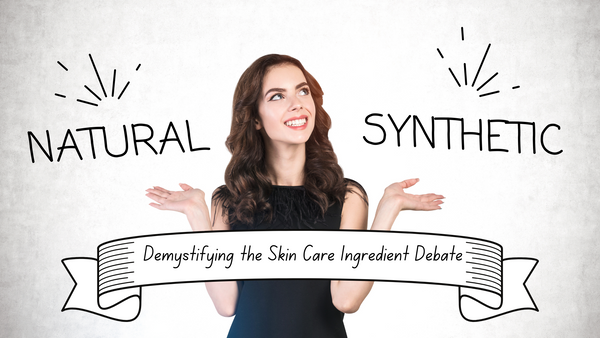“Natural” vs. “Synthetic” Ingredients: Demystifying the Skin Care Debate
Posted by Mack Leonard on Mar 3rd 2022
“Natural.” “Honest.” “Organic.” These are terms that commonly appear on the labels of skin care products, and they represent appealing values. But do they actually carry weight when it comes to the manufacturing, use, and effectiveness of the products? Are natural ingredients always a better choice than synthetic alternatives? Let’s discuss!
The Hidden Potential Drawbacks of Natural Ingredients in Skin Care
Consider a product that is advertised as “natural” in the sense that its ingredients are derived from nature, not made in a laboratory. At first glance, this appears to be a positive quality. But once you dig into the details, a different picture may emerge. A great number of chemicals found in nature are toxic: not everything derived from the environment is friendly to human touch. Further, harvesting a chemical from nature can involve unwanted consequences.
Harvesting implies that natural resources (in most cases plants, when applied to the skin care industry) are extracted and subject to processing in order to separate the desired chemical. If the chemical is present in extremely low concentrations in the source material, this can lead to large volumes of the plant material being extracted and processed to separate just a few ounces of the desired ingredient. So, in an effort to create a “natural” product, the manufacturing process has led to extensive reduction of ecological resources—less than a desirable outcome from an environmental perspective.
Don’t let this perspective frustrate you. Just because terms like “natural” may not necessarily denote a more environmentally beneficial skin care product does not mean that there are no options when it comes to ethical skin care. To see a way forward, we must do away with some unmerited preconceptions about synthetic ingredients.
The Surprising Benefits of Synthetic Ingredients in Your Skincare Products
Just as the term “natural” has hidden meanings worth unpacking, so too does the term “synthetic.” To some, synthetic chemicals are seen as inherently inferior to “natural” ingredients when in skin care. But this is not necessarily the case. As Dr. Hannah Sivak, PhD, founder of Skin Actives, writes on her blog: “Improvements in chemical methods are making it possible to imitate natural products like specific chemicals even to the right stereo-isomer, enzymes and growth factors, and obtain them very pure and active without having to start with 100 pounds of raw material and worrying about toxic contaminants.”
What this means is that modern chemistry has enabled us to create chemicals that are identical to those found in nature, but in a controlled, sterile environment, and without the exorbitant amounts of waste sometimes created as a byproduct of harvesting from the wild. At the base level, the body operates on chemistry: it cannot differentiate between chemically identical substances. Here, an unexpected distinction becomes clear: synthetic ingredients may be the most environmentally sound option. This is to say nothing of ingredients used in skin care that are derived from vulnerable or endangered plant life, in which case, the production of synthetic alternatives is an urgent matter for the preservation of the species.
Focusing on What Matters with Skin Care
The key takeaway is to focus on what really matters when seeking ethical skin care. The distinction between natural and synthetic ingredients is more complicated than it’s made to seem, and can serve as a distraction from issues that are more central to the goal of achieving healthy skin with minimal external harm.
Take this common experience for skin care enthusiasts: impulse-buying numerous products based on package design and buzzy verbiage on the label, only to find that they don’t agree with your skin and promptly forgetting about them in a bathroom drawer. Does the fact that these products may espouse “natural” values make this any less of a waste? Unfortunately, from the packaging to the plants harvested for the ingredients, these products sitting unused is contributing to environmental waste, regardless of the stated values of the brand behind them.
The Skin Actives ApproachTo Sustainable Skin Care
Truly mitigating harmful external consequences requires that we take a holistic view of our approach to skin care. Starting at the basic level of product formulation, Skin Actives insists on clean, minimalistic ingredient selection, forgoing unnecessary fragrances and preservatives and reducing the likelihood that a product will cause irritation (and join those other forgotten jars and bottles in the drawer). For the ingredients we use, we either create identical synthetic chemicals in the laboratory with essentially no waste, or we insist that ingredients sourced from the environment are harvested in a safe, sustainable fashion, free of contamination or unnecessary ecological degradation.
You can find out more about our efforts towards sustainability, safety, and responsibility by reading The Skin Actives Pledge on our brand values page.
The central goal of Skin Actives is to deliver healthy, effective skin care products to our customers at an accessible price. We’re proud to do this with a nuanced, compassionate approach to sustainability and ethics, which continues to evolve. Our scientists have applied informed, pragmatic reasoning to their selection of ingredients and synthetic analogues. We recommend approaching your skin care choices in the same way: with a wealth of quality information, an emphasis on health, and an eye on achieving the very best outcomes.

